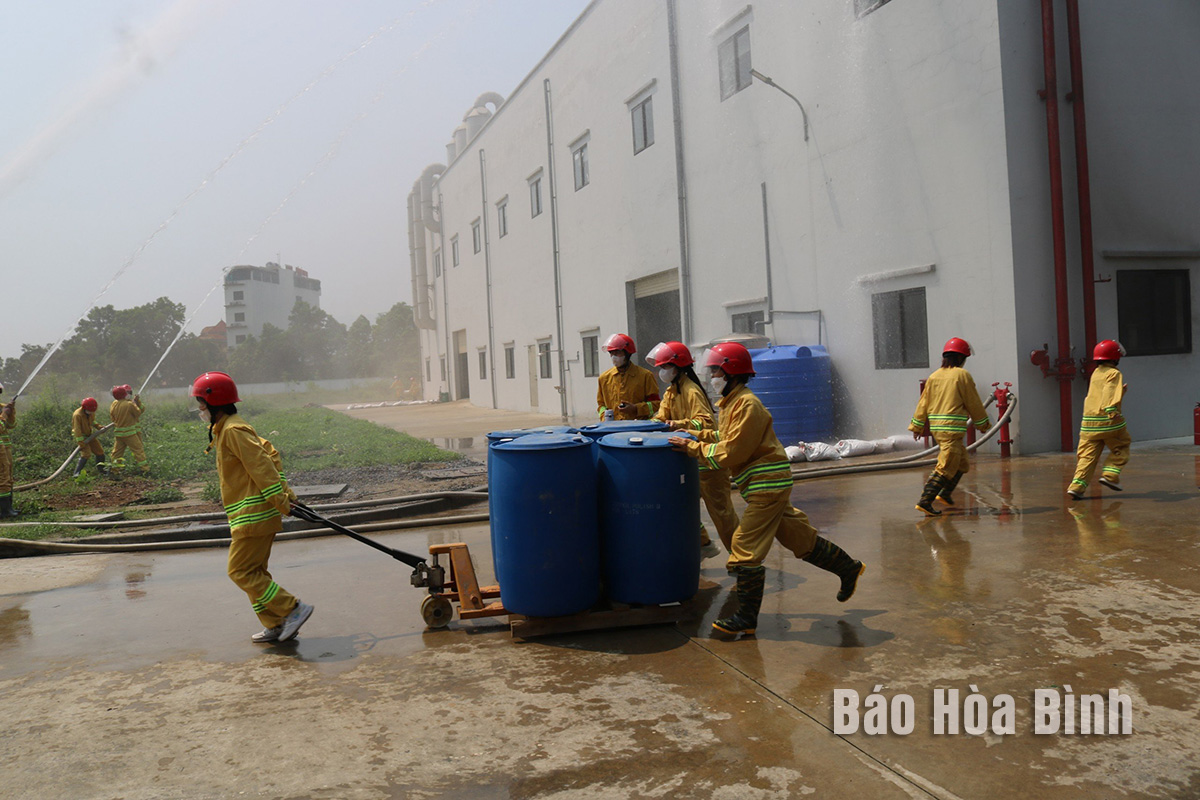
Hoa Binh has paid due attention to fire prevention at local industrial parks through promoting communications work to raise businesses’ awareness of fire safety, and guiding them how to well implement related regulations.
A firefighting and rescue rehearsal at VN Etch Home Technology Company Limited, Luong Son Industrial Park.
The province is now home to 107 production and business projects at industrial parks, most of them in the areas of support industry, electronics, household appliance, garment and textile, and plywood processing - a group of high risk of fire and explosion. Therefore, the management boards of the parks have worked closely with firefighting and rescue force on the fire prevention work.
A firefighting and rescue rehearsal was organised by the Hoa Binh Management Board of Industrial Parks and Hoa Binh police’s firefighting and rescue department at VN Etch Home Technology Company Limited, Luong Son Industrial Park, in the end of April. During the 30-minute drill, the participants instructed workers how to escape the site, operate rescue work at the workshop, protect the assets, and ensure smooth traffic flow.
Etch Home Technology Director Cho Chia Wen described the drill as a practical event that helps raise businesses’ awareness of the fire fighting and prevention work, and enhance their response capacity.
Together with the rehearsal, the management board organises annual conferences to popularise related laws among the enterprises in a move to ensure safety for production and contribute to creating a sound environment to lure investments.
Besides, investors of industrial parks from 50 hectares are ordered to set up a firefighting squad who receives regular training on the area and is responsible for inspection on measures to prevent fire and explosion, management of electrical system as well as dangerous substances and products.
Dao Village’s honey – a product certified with a 3-star OCOP (One Commune One Product) rating by Thong Nhat Agricultural Cooperative in Dao Village (Hoa Binh City) – is highly regarded by consumers for its quality, richness, and variety in packaging. The distinctively sweet taste of Dao Village’s honey leaves a lasting impression on anyone who has tried it.
In alignment with Project No. 07-DA/TU, issued by the Hoa Binh provincial Party Committee on November 1, 2021, Lac Thuy district has actively promoted investment and supported the sustainable development of its industrial and handicraft sectors during the 2021–2025 period. Alongside this, the district has remained committed to preserving and revitalising traditional craft villages.
Located in the northern part of Lac Thuy district, with a temperate climate and fertile soil, Phu Thanh commune has great potential and advantages in growing tea. The long-standing experience, combined with strict adherence to organic farming practices in the tea gardens, ensures that the dried tea products from Phu Thanh and Lac Thuy as a whole are sold out immediately upon production, providing a stable and prosperous life for the local people.
Amid efforts to streamline the administrative apparatus, Hoa Binh province has intensified measures to address challenges in land clearance, resettlement support, and infrastructure investment, aiming to speed up the progress of key projects.
Hoa Binh province has posted an unprecedented economic growth rate of 12.76% in the first quarter of 2025, marking its highest quarterly performance to date and positioning it as the second fastest-growing locality in the country, trailing only Bac Giang province.
Under current regulations, products in the One Commune – One Product (OCOP) programme that are rated three stars or higher must undergo re-evaluation every three months. However, in reality, some of these products fail to consistently meet the required standards, raising concerns about the sustainability of their OCOP certification. This underscores the urgent need for producers to enhance product quality and gradually develop their OCOP products into strong, marketable brands.



